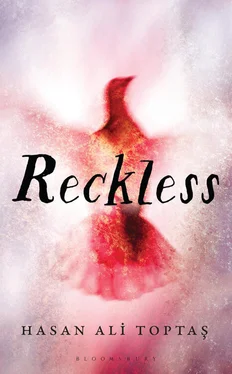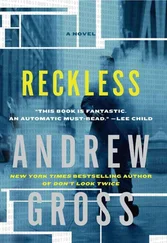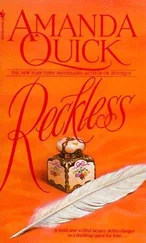‘I’m speaking as a mother,’ she said, leaning forward to look straight into Ziya’s eyes. ‘And I want you to know that I am eternally grateful for what you did for my son when you were in the army together.’
Ziya shot a look at Kenan.
For a moment, they came eye to eye, but Kenan lowered his head, needlessly picking up his spoon to stir his tea, as if he had only just added the sugar.
‘I’m not sure I understand,’ said Ziya, but when Kenan kept on stirring he looked back at Cevriye Hanım with surprise. ‘What is this good thing I did for Kenan?’
Cevriye Hanım leaned back and smiled, after which she stared for a time at her napkin, misty-eyed as only the sublime can be. And all the while, that napkin’s white played on her face, rippling ever so lightly across each wrinkle and crease.
‘I just know,’ she said. ‘Refined people like you are always like this, you forget your good deeds, and even if they’re not forgotten, you never speak of them. So it seems you have forgotten. . But who knows, it could also be that you do not wish to speak of it. But in the face of such modesty, I honestly don’t know what I can say now. Let’s leave it there. The last thing I’d want to do would be to make you blush by embarrassing you needlessly. But I hope you’ll permit me to say one last thing: I know that my son owes his life to you.’
Not knowing what to say, Ziya stared in shock at his plate.
‘And today I was thinking,’ Cevriye Hanım continued, ‘your fate and Kenan’s — they are twinned. Truly twinned. Our fates are all written by the same hand, with the same ink, to be sure, but this does not explain why your fates are twinned, I don’t think. Your fates — how shall I put it — to me they look as if they were written on the same page, with the same purpose, or the same innocence, or even while dreaming the same dream. You could almost say that you came into this world to do the same thing. Look, let me do the sums: you both did your military service in the same place, and between the same dates. And then you each lost your wives. And neither of you remarried. And also, neither of you had wives who gave you children. And then, in addition to all that, and after all those years, you’re both here, living in the same village. Has none of this crossed your minds?’
Kenan and Ziya exchanged glances.
‘No,’ said Ziya. ‘I can honestly say it hasn’t.’
‘Me neither,’ Kenan mumbled.
Cevriye Hanım looked at each in turn and smiled, nodding wisely, over and over, as if she was pulling them out of a very deep sleep.
A silence fell over them for a time.
Then, in a hoarse voice, Besim excused himself. Gently leaving his napkin at the side of his plate, he rose from the table. As he watched the boy walk towards the house, Ziya again thought he was looking at the son they had killed in his mother’s belly. Reaching the door, the boy stopped in the shade of the canopy and glanced over his shoulder. And that was when Ziya noticed how much he looked like the silhouette of the young man he had seen wreathed in smoke in Binnaz Hanım’s sitting room, and a shiver went through him.
‘Health to your hands,’ he then said, turning to Cevriye Hanım in surprise. ‘Your gözlemes were delicious.’
‘I’m glad you enjoyed them,’ said Cevriye Hanım.
As she spoke, she too looked over at the door Besim had just passed through.
‘Kenan may already have told you,’ she said then. ‘This village has just one old rickety grocery store, my boy. And nothing inside it is worth much. It doesn’t even sell bread, as a matter of fact. Everyone in this village makes their own, that’s why. And so, if you’re going to say, “I’m not used to it, I can’t eat yufka ,” then that would mean you’d have to buy your bread from town. But getting there and back, that’s yet another matter. There’s no regular service between town and this village, that’s one thing. When the schools open, there is a clapped-out minibus that huffs and puffs its way over there arriving here at the crack of dawn, but grown-ups aren’t allowed on it. There’s nowhere to sit or stand in it anyway, the poor children have to huddle together like matchsticks packed inside all together. There’s so little room that all their arms and legs and heads and shoulders get all mixed up. If one of those children wanted to scratch themselves, they probably wouldn’t be able to find their own bodies. And with all that swaying back and forth, they’d be as bruised as ripe pears by the time they got to town. How they manage to teach them anything in that state I cannot say. And who it was who thought up this evil business of bussing children to schools, I cannot say either. A child’s school should be at the other end of the street he plays in, wouldn’t you say? That would allow a child to remember his school days warmly. And then, seeing as a child can always run away from school if he has a mind to do so — even if he never does, even if he always holds his pencil in the same hand, from time to time he has to see how it feels to hold it in the other, or else he’ll have trouble breathing, and while he’s having trouble breathing, he’ll be looking at all those letters on the page. Won’t he? So tell me, what’s the point of it — piling those children into a metal box, and dumping them in one big lump into a concrete box. And there they stay, all day long, and when those poor children look out of that school’s windows, they see strange streets that carry no memories. Not a single sly whisper, to call them back. . But never mind. As I already said. You can’t count on that minibus to get you into town and back. Once a week the Ovaköy minibus stops out there on the main road, and it picks up anyone going in for the town market, and it drops them off again around the time of the evening call to prayer. So that’s the only way you can get into town, once a week. But how you’d keep your bread from going stale and mouldy in the course of that week I cannot say. What I say is that we make you yufka once a month. It’s more supple, and all you have to do is moisten a few sheets before you eat and they’re fresh as fresh.’
‘Thank you,’ said Ziya. ‘I still haven’t worked out how to manage things. If you want to know the truth, I don’t really want to go into town once a week. No, I don’t want that at all. But I think we’ll be able to work something out, in time.’
‘That’s fine,’ said Cevriye Hanım, ‘but do keep my offer in mind. It won’t be any trouble for us, just a few more sheets. My daughter and I could sit down for an hour or two and make you all the yufka you need for a whole month.’
There followed a short silence.
Then Ziya stood up. After thanking Cevriye Hanım and kissing her hand, he headed for the gate. ‘Why don’t I come with you?’ said Kenan, and off the two went, walking in silence in the afternoon sun, accompanied by what might have been the faint clatter of dishes, or slippers shuffling, or childish laughter floating over the brick courtyard walls. And with these sounds came the fug of manure, rotting fruit and wet laundry. Halfway down the lane, they met a hunchbacked old man groaning under the weight of the plastic vats he was carrying from the fountain back to his donkey. As he passed them, he suddenly stopped to adjust his cap, as if ashamed to have been caught unawares; solemnly lifting his hand as high as his visor, he wished them a good day.
Ziya was still wondering what this good thing was he had done for Kenan in the army. He wanted to ask, if only Kenan would give him the chance.
‘And now we have these plastic bottles,’ said Kenan, waving in annoyance at the donkey behind them. ‘I’m not sure if you know this, but in the old days we used wooden barrels that smelled of resin, and in each and every one of them, you could hear a whole forest rustling.’
Читать дальше












